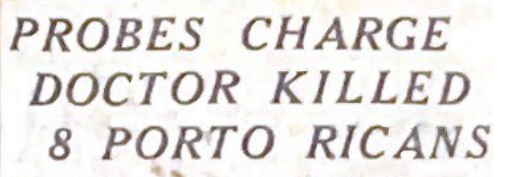The Responsibility to Free Puerto Rico

By Amy Golzar-Beverley
“It would be ideal except for the Puerto Ricans.” That line was written by Dr. Cornelius Rhoads in 1931, while stationed in Puerto Rico conducting Rockefeller-funded medical research. He bragged about killing Puerto Ricans. He mocked their bodies, their lives, their existence. And then he left, unpunished. He went on to oversee the distribution of isotopes—radiation—at the U.S. Atomic Energy Commission, lead the U.S. Army’s chemical weapons programs, and helped develop chemotherapy - all at the expense of unconsenting Puerto Ricans.
My great-grandfather, James R. Beverley, was governor of Puerto Rico at the time. Although he had just been Attorney General, he made no honest effort to hold Rhoads accountable. Instead, he allowed a medical doctor to play the role of District Attorney and gave an inaugural speech recommending birth control to shrink “the poorer and more ignorant classes.” For this, he was celebrated by Ivy League eugenicists. He helped write the logic that still governs Puerto Rico today - A Puerto Rico without Puerto Ricans.
That logic has not changed. Puerto Rico remains a colony of the United States—a place that 'belongs to but is not part of' the nation, according to the still-standing Insular Cases. Puerto Ricans are U.S. citizens, yet they cannot vote for president. They have no vote in Congress, except in menial committee matters. They live under the control of an unelected fiscal board created by Congress. Their rights and obligations are decided by others.
The consequences are devastating. Cancer rates in Vieques are nearly 30% higher than on the main island after decades of U.S. military weapons testing. Public hospitals are collapsing. Beaches are being sold off. Act 60 invites wealthy Americans to avoid taxes while local residents are displaced. And unless stopped, Puerto Rico could lose up to 83% of its Medicaid funding by 2027.
None of this is accidental. It is not a result of mismanagement. It is the outcome of colonial governance and deliberate policy decisions. Puerto Rico has not been forgotten. It has been used and abused.
This truth matters especially to us U.S. citizens who believe in justice. If we claim to value democracy, then Puerto Rico’s status must be unacceptable. If we believe in civil rights, then we cannot ignore the people being denied them. If we believe in freedom, we must extend it beyond our borders.
I was raised in Tulsa, Oklahoma—land that the U.S. Supreme Court recently recognized as part of the Muscogee Nation in its McGirt decision. The Court ruled that sovereignty could not be erased by silence or neglect. That being true for Indigenous lands in Oklahoma, it should be true for Puerto Rico.
There is no path to justice without accountability. The United States must support a binding, democratic process in Puerto Rico by means of a real Constitutional Convention—with complete independence as a viable, resourced option. It must acknowledge the harm done, repeal colonial policies such as the Insular Cases and PROMESA, and begin the long overdue process of reparations.
Ruth Reynolds, the namesake of our Solidarity Front, understood this. A white woman from the mainland, she co-founded the American League for Puerto Rico’s Independence and refused to testify against freedom-fighters in court. She served time in jail in Puerto Rico for her beliefs. She didn’t view Puerto Rico’s freedom as someone else’s issue. She knew it was a matter of U.S. integrity.
We must follow her lead. Puerto Rico is not asking for charity. It is demanding dignity. Independence is not a threat to our own freedom. It is the fulfillment of the very principles we say they believe in.
This is not just Puerto Rico’s fight. It is a test of ours, of our own social fabric. What kind of country do we want to be? What kind of citizens are we willing to be?
Puerto Rico must be free. And we—descendants of their invaders—must be the ones called to help make it so.
Member discussion